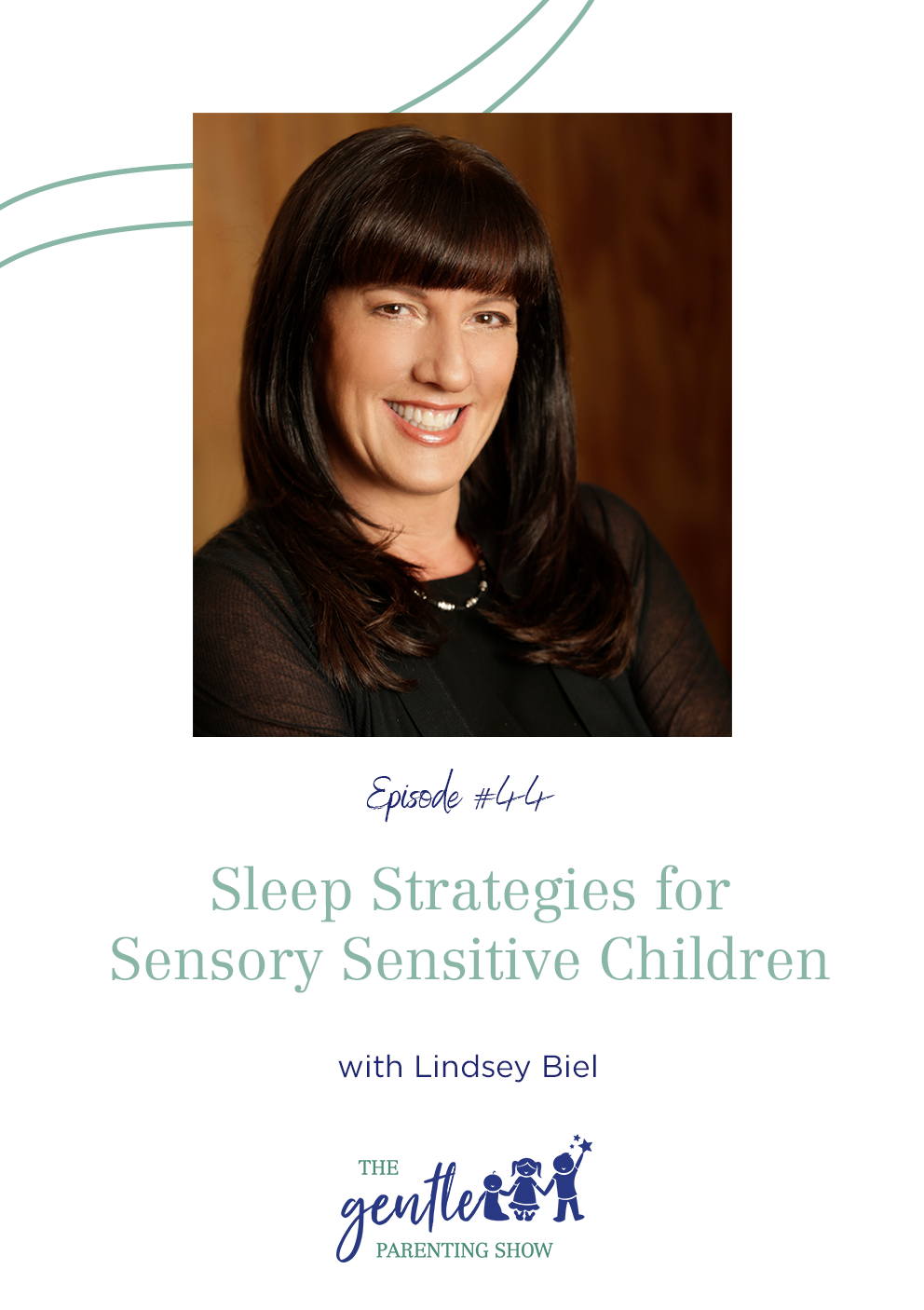Sleep Strategies for Sensory Sensitive Children with Lindsey Biel
On today’s episode of The Gentle Parenting Show, Kim is joined by Lindsey Biel. Lindsey is an occupational therapist who works at a New York-based pediatrician’s office and has been practicing for 23 years. She specializes in sensory processing issues and optimizing learning for sensory-sensitive kids. Today Kim and Lindsey combine their two specialties, sleep, and sensory processing, to share tips and tricks to get these sensory-sensitive children to sleep.
What is Sensory Processing?
Sensory processing is something we all do – it’s how we learn about and approach the world. Sensory processing is how we take all the bits of information and transform them into the little sensory messages and information that help us make sense of our surroundings. It helps us respond and grow in the world. Most of us can sensory process automatically and seamlessly.
However, sensory processing can be more of a challenge for others. There’s a big difference between being a little picky and having full-blown meltdowns. Sensory issues affect everyday life from eating to sleeping.
Parenting a Sensory Sensitive Child
If you have a sensory-sensitive child, your job isn’t to change them, but to help them figure out how to live in the world. Dive in and really understand what is driving their struggles. Is it touch, smell, sound, or something else? Lindsey has a FREE sensory checklist on her website that you can print out for toddlerhood and beyond to help see sensory patterns. Lindsey suggests a multiprong approach – first, figure out what’s really going on. Then, protect them from unnecessary pain as you build skills.
Sensory Differences and How They Affect Sleep
When it comes to sleep, think about how much it takes to fall asleep. You need physical comfort, calm, and lower energy levels to sleep. Neurological signals need to happen to fall asleep. For your sensory-sensitive child, go through their nighttime routine piece by piece to find out what you can do to help. Is it a touch thing? An energy thing?
Lindsey covers the five senses and how they relate to sleep. The five senses are more complex than just sight and sound, but 3 additional senses. The key one is the vestibular sense. This is the sense that’s in our inner ear. The vestibular organs detect changes in relation to gravity and speed. This is how you know you’re moving too quickly, slowly, etc. For example, a baby who gets extremely fussy when you put them down to change them might have vestibular problems.
Proprioception receptors are another sense. These are located in our joints, muscles, and connective tissues. This tells you where your body parts are. For example, if you touch your fingers above your head, your proprioceptor receptors are telling you they are touching without looking. You can tell a child doesn’t feel safe and secure if their proprioceptor isn’t getting the information they need to feel safe. They may hug too hard, push too much or just be too physical.
The final sensory system that a lot of people haven’t heard of is the interoceptive receptors. This is how we recognize our body’s physiological state. It helps us ask how our bladder is. Our hunger? Thirst? If a child does not easily get signals about these needs, then how can we expect them to get signals to sleep?
Sleep Strategies for Sensory Sensitive Children
A popular sentiment among sleep experts is to do a calming bedtime routine 25-45 minutes before bedtime. When dealing with a sensory-sensitive child, you need to pull back and think of a long-term sleep plan. A few hours before bedtime, engage your child in very active movement. You want them to be worn out hours before they go to sleep. Movement increases serotonin and feel-good chemicals in the body that will help them sleep better at night.
If your child has stress or anxiety in their body, that increases cortisol in the system and prevents them from sleeping. For other kids, the movement might not be the best choice 2 hours before bedtime, but something like colors, crafts, or art.
When Should a Child Go To An Occupational Therapist?
Lindsey’s practice doesn’t include medication or procedures. The idea of an occupational therapist is to give the child and parent exercises to change their brain so a child can become less sensory-sensitive.
Lindsey gives strategies to protect and heal. For example, she may help you pinpoint that your child has sound sensitivity and will help you with strategies to protect that child. She will recommend activities and skills to help the child remodel their brain.
One of the most important things that Lindsey teaches is for children to self-advocate for themselves. Children, especially sensory-sensitive children, need to learn how to do this at a young age to protect themselves throughout life.
Connect With Lindsey
If you have a sensory-sensitive child, Lindsey has many resources on her website and Facebook to help your family.




